August 11-13 2023
— Joseph Dias (LLL-SIG Coordinator)
It was a pleasure presenting in a Lifelong Language Learning stream at the OkiJALT Summer Symposium 2023 in Naha, Okinawa along with Kinsella Valies, Mariana Oana Senda, Dom Jones, and Miwako Dias. The conference, which served as our annual “Mini-conference, was co-sponsored by the Okinawa Chapter of JALT (OkiJALT) with JALT’s Materials Writers Special Interest Group (MW SIG) and the Lifelong Language Learning Special Interest Group (LLL-SIG) on the weekend of August 11-13 2023 at the Okinawa Prefecture Gender Equality Center, Tiruru.
Before our stream of LLL-SIG talks, on the first day of the conference, Diane Nagatomo gave a rousing plenary talk that covered her storied life as a writer of EFL texts, newspaper columns, and—most recently—a novel.
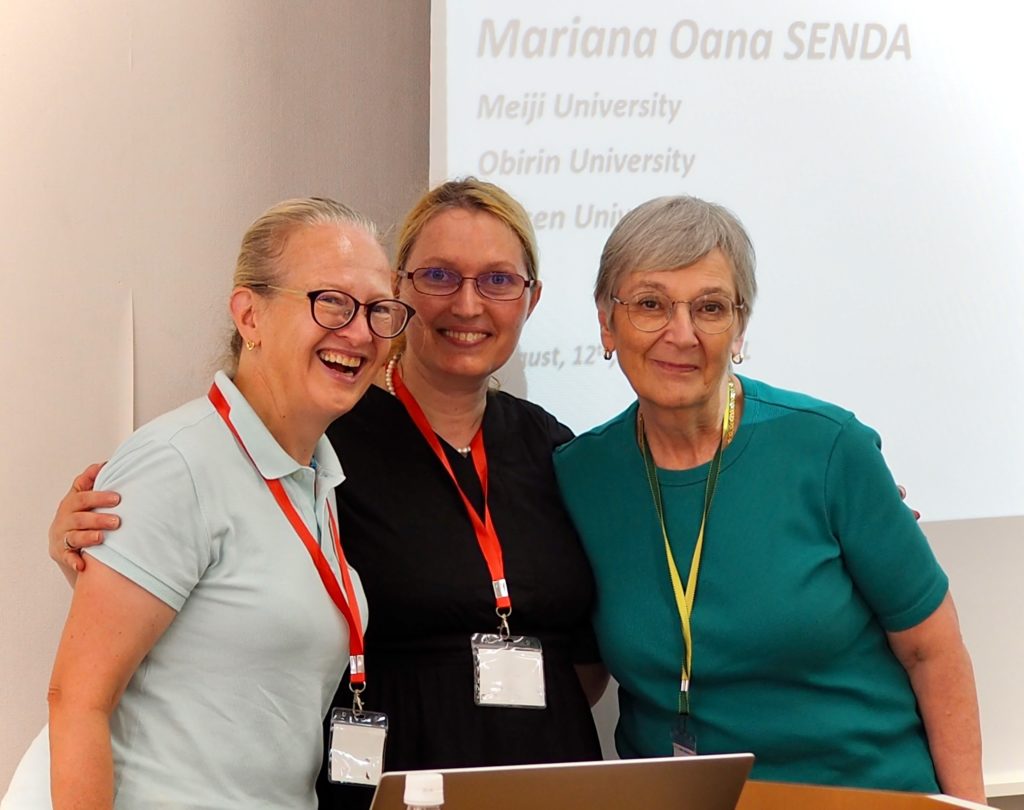
Diane Nagatomo (far right) along with Julia Kimura (JALT National Membership Chair, far left) and our Co-Membership Chair and conference speaker, Mariana Oana Senda, in the middle.
Each of the LLL-SIG-sponsored talks will be briefly introduced with accompanying photos. The first speaker was Joseph Dias who spoke on the topic “Cultivating empathy through the use of student-created first-person vignettes.” Here is an abstract of that talk:
Teachers and researchers have explored ways of helping individuals feel greater empathy in order to reduce prejudice and to encourage prosocial attitudes. Training programs that aim to foster empathy have been shown to be effective in the education of medical students (Pacala, Boult, Bland, & O’Brien, 1995), social workers (Erera, 1997), those who interact with rape survivors (Jacobs, 1998), and students of literature (Cohen, 2021). The speaker demonstrated how empathy can be cultivated among university students by having them create vignettes from the perspectives of individuals who are intimately connected to controversial issues they are researching. The ultimate goal of this course on critical literacy is for students to flesh out an imagined NGO that constructively addresses social or environmental problems arising from their selected issue. A useful activity toward this goal was found to be one in which narratives are created by the students based on perspectives they identified as key to understanding the issue. Through these accounts, students gain a deeper emotional connection to such issues as cyberbullying, the aging population, and rising youth suicide rates. How teachers might adapt this activity for a variety of ages, levels of maturity, and teaching settings was explored.

Joseph Dias delivering his presentation on “Cultivating empathy through the use of student-created first-person vignettes.”
The second speaker in the LLL-SIG stream, Miwako Dias, representing Dialogue in the Dark Japan (https://did.dialogue.or.jp/totonou/en/), spoke on the topic “Communicating without borders: Communication with the visually and hearing impaired.” Here is an abstract of that talk:
Since the dawn of communicative language teaching, instructors have been expected to equip students with Communicative Competence (Hymes, 1972), Intercultural Competence (Bennett, 2011; Deardorff, 2006; Gudykunst, 2002), and Intercultural Communicative Competence (Byram, 2020). However, have these successively more nuanced understandings of the context, purpose, and goals of communication allowed teachers to fully prepare students for mutually satisfying interactions with the deaf and visually impaired? The speaker described a program developed by the founder of the social business Dialogue in the Dark, Andreas Heinecke, called Dialogue in Silence, which broadens the communicative repertoire of participants by putting them in situations in which they must communicate with each other, and with deaf facilitators, without words or conventional sign language. Using noise-canceling headphones in an area of complete silence, visitors complete tasks and, along the way, discover how to make better use of facial expressions, body language, and other forms of non-verbal communication. Might this be a model for how language teachers can broaden the communicative options and modalities students use to communicate? The history and mission of the Dialogue Social Enterprise were presented, and the speaker shared what she has learned about communicating with blind and deaf colleagues. An interactive activity involving the collaborative representation of song lyrics was used to enjoyably illustrate points made by the speaker.
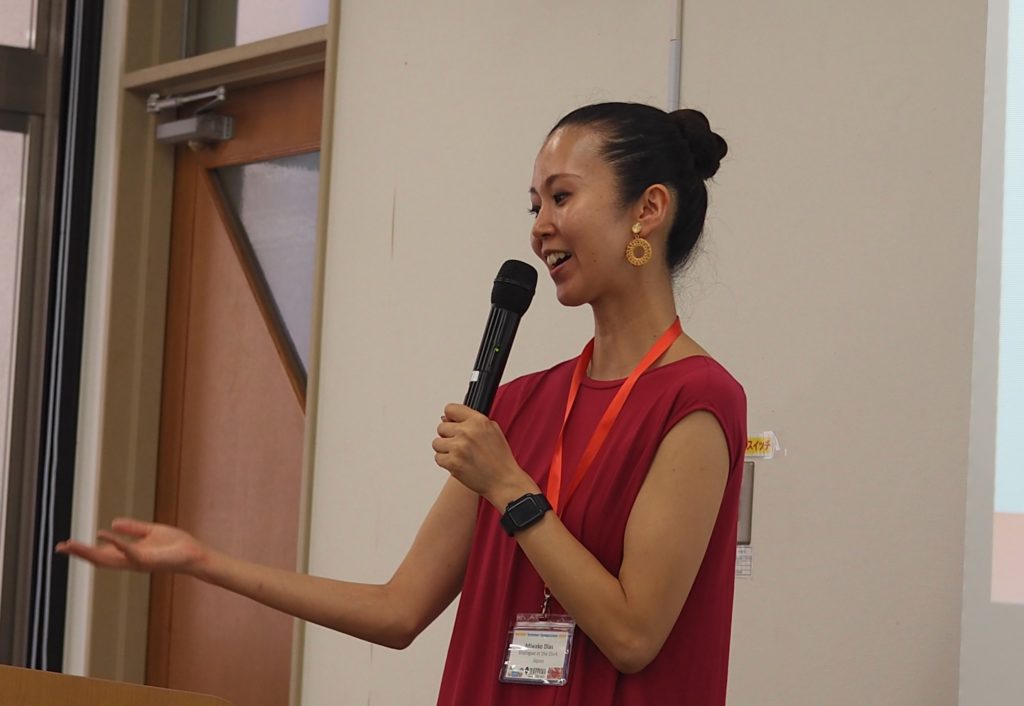
Miwako Dias gesturing during her presentation on “Communicating without borders: Communication with the visually and hearing impaired.”
The third speaker in the LLL-SIG stream was Dom Jones of Sendai Seiyo Gakuin College, who spoke on the fascinating topic “Fostering student well-being, safety, and English skills through martial science games.” Here is an abstract of his talk:
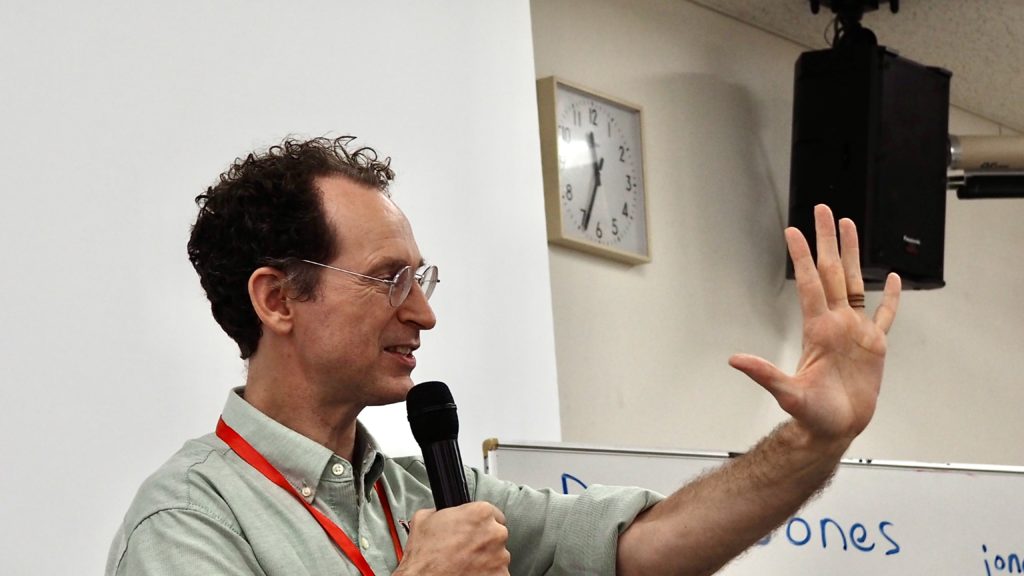
Dom Jones demonstrating a way to evade an attack during his presentation.
James Asher’s Total Physical Response (TPR) has often been used to teach simple grammar points and vocabulary items with a focus on young learners. Its potential to teach learners of all ages more challenging target language has rarely been explored. In the Ryukyu Islands, the birthplace of a variety of martial arts, the speaker introduced various TPR martial science games and showed how selections from the target language could be incorporated into simple martial art drills. These fun games are easily performed by learners of all ages, including those of limited strength and mobility. Game participants are asked to respond to either verbal or visual cues to perform set movements. As well as being a fun way to learn language, other benefits of these exercises include enhanced personal safety, reductions in stress, greater productivity, and an improvement in mental health.
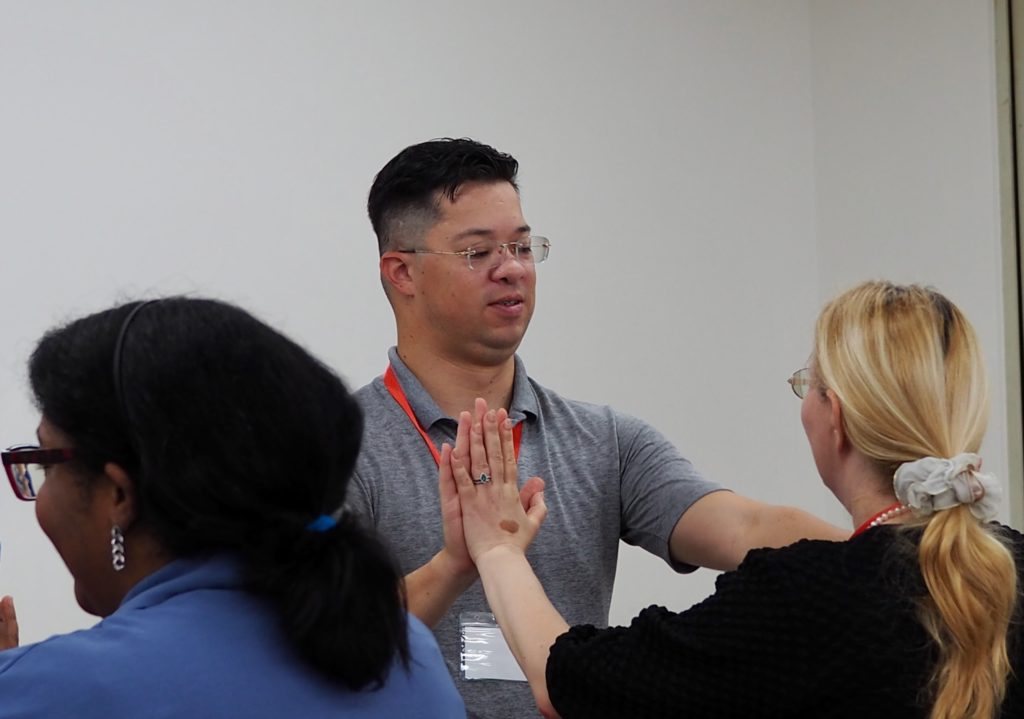
Two participants at Dom Jones’ workshop trying out a warm-up to the martial science games which were later introduced.
The fourth speaker in the stream, Mariana O. SENDA, representing Meiji University and Obirin University, spoke about “The role play revolution: Redefining paths for lifelong language learning.” Here is an abstract of that talk:
“The Role Play Revolution: Redefining Paths for Lifelong Language Learning” was a captivating 60-minute workshop delving into role play’s transformative influence in language learning. The workshop demonstrated how role play fosters meaningful communication, elevates learner motivation, and nurtures essential lifelong language learning skills. Initially, the speaker explored the theoretical foundations and empirical evidence supporting role play’s effectiveness in language learning, grounding the discussion in situated learning and communicative language teaching theories. Subsequently, the workshop shifted to illustrating practical role play activities, from basic dialogues to intricate problem-solving scenarios. Attendees were asked to participate in these activities, which enabled them to gain firsthand experience of their value. The final section emphasized the link between role play and lifelong language learning, highlighting role play’s contribution to developing key lifelong learning skills like autonomy, critical thinking, and learner engagement. The speaker also provided strategies to encourage students to pursue language learning beyond the classroom confines.
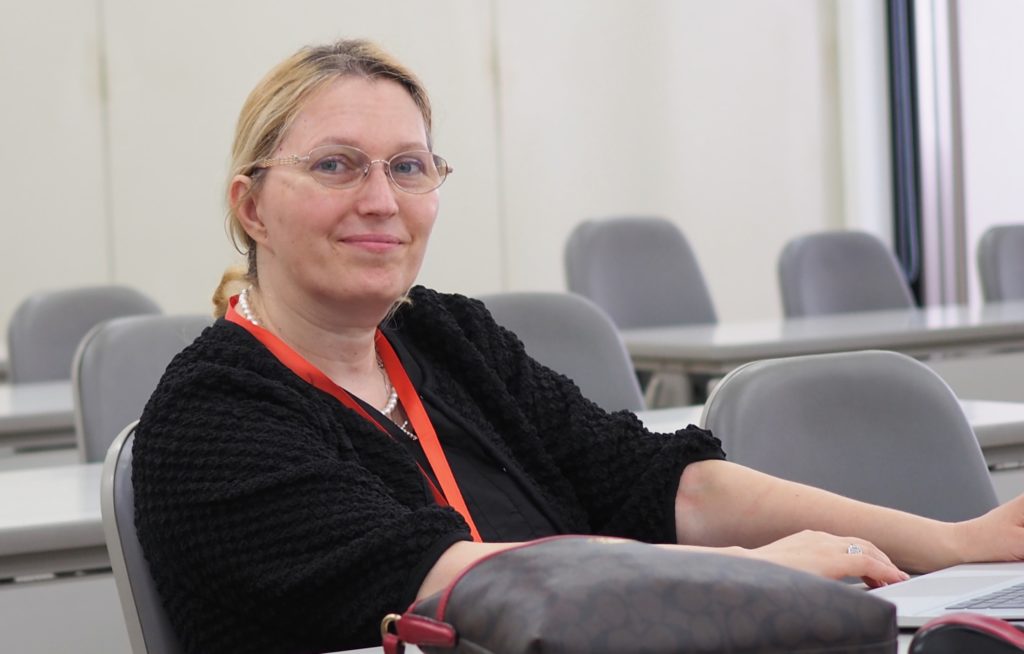
Mariana Oana Senda shortly before her talk on “The role play revolution: Redefining paths for lifelong language learning.”
The fifth and final speaker in the LLL-SIG stream of talks was Kinsella Valies (Jissen Women’s University and Aoyama Gakuin University), whose presentation included a talk on the theoretical aspects of using role playing games in language learning, followed by a workshop that vividly illustrated the concepts. Here is an abstract of the initial talk, “Mission Possible: Leveling up in English at home and beyond.”
According to Schneider (2023), table-top roleplaying games (TTRPGs) simulate meaningful encounters of human behavior and interaction that allows learners to try out different social and communicative strategies without facing any real-world penalties. The main objective of this presentation was to examine how the integration of TTRPGs in informal, adult EFL can lead to significant positive outcomes for learners. The theoretical framework is phenomenologic, based on dialogues, interviews and, reflections between the researcher and their five participants. Participants are lifelong English learners and native speakers from varied backgrounds with the common denominator of having more than 10 years of TTRPG experience. This talk will feature on one hand, personal learning stories of L2 English learners and NNS English educators using TTRPG to improve their speaking. On the other, the experiences of game leaders guiding L2 players through problem-solving scenarios and making them aware of culturally appropriate knowledge will showcase upskilling beyond language. By exploring the impact of table-top RPGs through phenomenology, the researcher aimed to provide recommendations for learners seeking to enhance their motivation, autonomy, critical thinking, problem-solving skills, and fluency. This 20-minute talk provided rich insights into the potential of RPGs as valuable, transformative educational tools.
The workshop portion of Kinsella Valies’ presentation was titled “Mission Possible II: Table Try Out.” Here is a description of the workshop:
In this 60-minute workshop, part two of the table-top RPG presentations, the speaker transformed into the game leader, “who provided the players with situations that must be solved by them (Schneider, 2023)”. The participants took on the roles of L2 adventurers on a journey that included: speaking up when it was our turn, asking for clarification, using verbs and description creatively, competitive problem solving and critical thinking in English. Sharing peer advice was encouraged. Premade characters were made available for selection and dice were provided. All participants except the game leader controlled a character with different skills to help them figure out how to tackle the problems placed in front of them (Hitchens and Drachen, 2009). After a short introduction to simplified rules of the game, the adventure began. We used teamwork, effective time-keeping and communication to defeat the risen evil in an attempt to bring peace to our local town. There was a debriefing after the adventure during which player-participants were asked to discuss their experiences.

Kinsella Valies enthusiastically speaks about the research she conducted on language learners with many years of TTRPG experience during her talk “Mission Possible: Leveling up in English at home and beyond.”